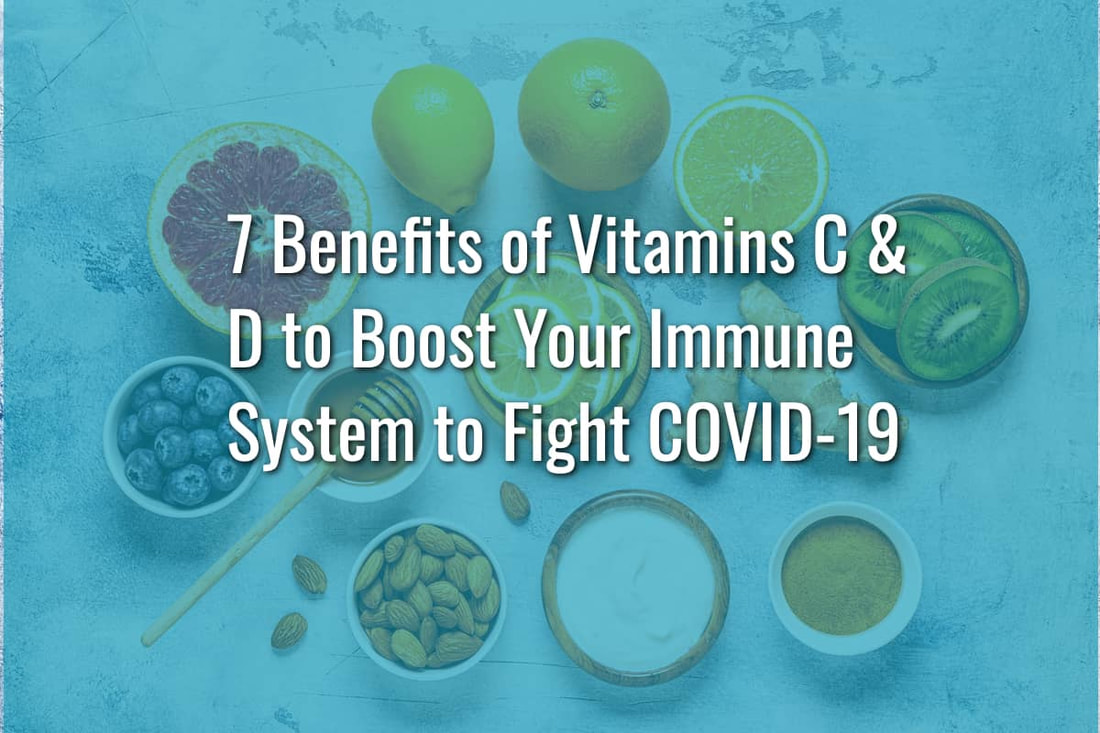7 Benefits of Vitamins C & D to Boost Your Immune System to Fight COVID-19The world is waiting for a COVID-19 vaccine. But while teams are hard at work trying to find one, all we can do is stay indoors and try to avoid contracting the virus as best we can. A key part of this is eating right to keep your immune system strong and healthy. Getting a good mix of fruit and vegetables might not be as easy as it used to be, but a huge variety of foods can give you helpful nutrients. Vitamin C and D are two of the most important, but why? And how can you get more of them into your body? What Foods Contain Vitamin C and D?Experts recommend the average adult should try to get 65 to 90 milligrams of vitamin C and 10 - 20 micrograms of vitamin D per day. You can find vitamin C in:
These foods either make great snacks or fantastic additions to delicious meals, such as pastas, curries, fruit salads, and more. Generally, the more colors you have on your plate, the better. And what about vitamin D? You can find that in:
Another major source of vitamin D is sunlight. With so many of us in self-isolation and afraid to go outside right now, getting some nourishing UV rays on your skin might seem hard. But you don’t need to bask in the sun for hours for a good dose of vitamin D: as little as 15 minutes might be enough, depending on your skin color. 7 Benefits of Vitamin C and DHere are 7 benefits of vitamin C and D in boosting your immune system and keeping your body healthy: 1. Help create white blood cellsOne of the biggest benefits of vitamin C is its overall ability to boost your immune system. It does this by stimulating production of white blood cells (known as lymphocytes and phagocytes), which can help to protect against infection. Lymphocytes are powerful antibodies created as a response to pathogens (bacteria with the potential to cause disease) or antigens (harmful toxins). Phagocytes identify pathogens and other dangers within the body, and surround them. They digest and neutralize the threats to remove them safely. Vitamin C also helps these cells do their job better while working to protect them from free radicals and other molecules with the potential to cause harm. 2. Turn on the immune system’s key peptidesVitamin D can help you reduce your danger of contracting infectious diseases by switching on important peptides (a compound of two or more amino acids) within the immune system. This starts a response that works to keep potential invaders away before they lead to a potentially-harmful infection. 3. Reinforce the body’s natural defensesAnother key benefit of vitamin C is that it can make your body’s own natural defenses stronger. As an antioxidant, vitamin C protects cells from free radicals and can fight off chronic diseases (such as heart disease), and can boost the antioxidant levels in your blood significantly. 4. Prevent your immune system from attacking itselfThe immune system can become so highly-stressed and confused that it starts to attack the body’s own tissue instead of threats like viruses and bacteria. Autoimmune diseases can affect almost any part of the body, and common versions include inflammatory bowel disease, psoriasis, lupus, and multiple sclerosis. Fortunately, vitamin D helps to reduce the risk of autoimmune diseases by encouraging the production of T cells, which differentiate between unwelcome and welcome cells. A good amount of vitamin D basically works to create a more effective, smarter immune system that’s less likely to start attacking itself and focus on fighting harmful invaders instead. 5. Improve healing timeHealing times may be improved by both vitamin C and vitamin D. Vitamin C is an ascorbic acid, which helps the body produce collagen and ensure it’s as strong as it has to be. Vitamin D stimulates the formation of a peptide known as cathelicidin, which helps the immune system fend off potential wound infections. 6. Reduce the risk of respiratory infectionsOne of the biggest risks COVID-19 poses is respiratory issues. Some people might develop an uncomfortable dry cough, while others could end up affected by a far more serious problem — pneumonia. This happens when the COVID-19 infection reaches the air passages running to the lungs. Inflammation starts to strike, the nerves in the airway are irritated, and air sacs within the lungs start to produce inflammatory substances. Pneumonia can be fatal, particularly for those with existing respiratory conditions. Vitamin D has been shown to help protect people against respiratory infections, and vitamin D deficiency has been linked to the development of pneumonia, particularly in children. 7. Combat iron deficiencyFinally, let’s talk about iron. Iron is a vital nutrient which helps the body to create red blood cells and transport oxygen. Being deficient in iron can lead to anemia and leave your immune system weaker than it should be. Vitamin C is essential for converting iron into a form that’s absorbed more easily. This is especially important if you’re on a plant-based diet, as meat tends to be richer in iron. Studies show that vitamin C can help to prevent iron deficiency and control related anemia, potentially strengthening the immune system. Getting the recommended amount of vitamin C and vitamin D in your diet can help your immune system work as it should, which is more important than ever as COVID-19 continues to claim lives worldwide. We all have to look after our health by eating the right foods, though you can still give your body the essential nutrients it needs in another way. IV therapy is a quick, simple option, particularly the IV Immune Boost treatment. This is formulated with vitamin C and Glutathione, an antioxidant capable of preventing cell damage. To learn more about IV therapy, speak to a member of our expert team today.
0 Comments
Your comment will be posted after it is approved.
Leave a Reply. |
AuthorDedicated and passionate Astra Medicare staff. Archives
June 2024
Categories
All
|


 RSS Feed
RSS Feed